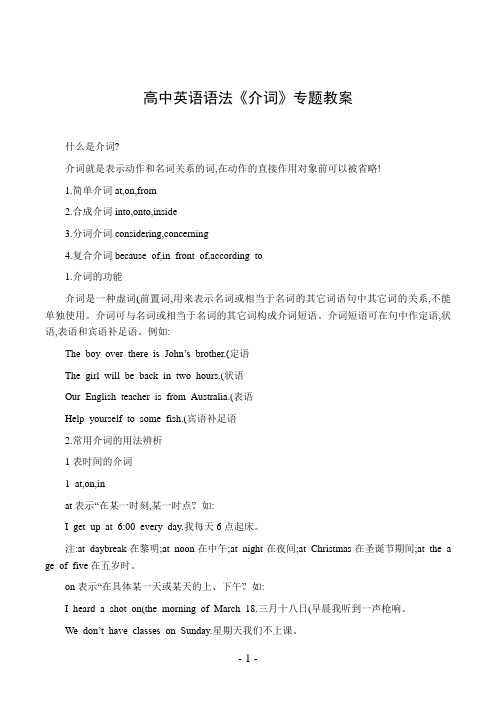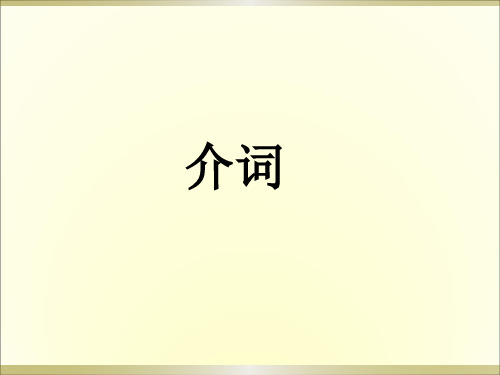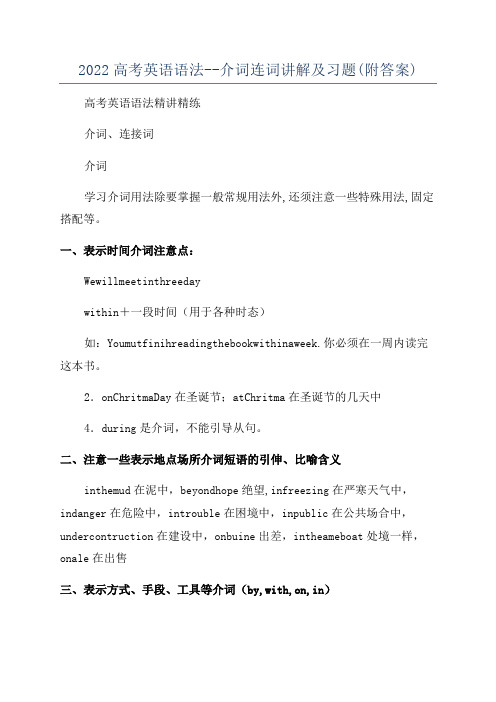高中英语语法-介词
2023届高考英语语法知识:常用介词考点分析讲义

2023年高中英语语法知识精讲:常用介词考点分析一、shoot to, shoot at 及其他有网友问:在语法书和教辅书上,读到有关shoot to和shoot at 的区别,都说shoot to用于距离远、体积大的物体;shoot at用于距离近、体积小的物体。
请问,是这样的吗?这种说法很牵强,属于只看到现象,未触及本质。
用shoot to 还是shoot at与物体的远、近、大、小,没有直接的关系。
以下是我的理解和看法:shoot作“射击”讲,既是及物动词,也是不及物动词。
及物时表示“射中”,如:shoot the tiger(射中老虎);不及物时,跟不同介词搭配有不同的含义,例如:shoot at the wolf 朝着狼射击shoot to the woods 朝着森林方向射击shoot into the house 朝房内射击通过比较,我们发现:shoot本身没有变化,差别就在于,不同的介词有不同的含义。
at 表示“目标”;to表示“方向”;into表示“朝…….里面(有容积的物体)”。
所以,它们的区别与射击目标的“远、近、大、小”没有直接关系。
比方说,“朝着东方射击”,就用shoot to,因为to 表示“方向”,这时不能用at;wolf是目标就用at,但woods用at 就不合适。
类似的用法,也适应于look,point等词,请读者仔细体味:look at the blackboard (看黑板)look to the west(向西看)look into the water(向水里望去)point at the picture (指着图片)point to the wall (朝墙的方向指去)point into the sky(向空中指去)during the night与in the night的区别有朋友在本站“答疑中心”询问 during the night 与 in the night 的用法区别。
高考英语语法易错点30题精讲练专题05 介词(解析版)

2021高考英语语法【介词】易错点30题精讲练解析版专题五介词与介词短语易错点集锦2021高考英语语法【介词】易错点对点训练30题I.高考真题诊断·单句语法填空1.We were first greeted with the barking by a pack dogs,seven to be exact.2.I was searching these three western lowland gorillas I'd been observing.3.This trend,which was started by the medical community(医学界) a method of fighting heart disease, has had some unintended side effects such as overweight and heart disease-the very thing the medical community was trying to fight.4.After school she plans to take a year off to model full-time;before going to university to get a degree engineering or architecture.5.It ran for just under seven kilometers and allowed people to avoid terrible crowds on the roads above as they travelled to and work.【答案详解】1.of 解析:a pack of 意为:“一群”。
2.for 解析:search for “寻找”,为固定搭配。
3.as 解析:此处指作为抵抗心脏病的一种方法。
高中英语语法《介词》专题教案

高中英语语法《介词》专题教案什么是介词?介词就是表示动作和名词关系的词,在动作的直接作用对象前可以被省略!1.简单介词at,on,from2.合成介词into,onto,inside3.分词介词considering,concerning4.复合介词because of,in front of,according to1.介词的功能介词是一种虚词(前置词,用来表示名词或相当于名词的其它词语句中其它词的关系,不能单独使用。
介词可与名词或相当于名词的其它词构成介词短语。
介词短语可在句中作定语,状语,表语和宾语补足语。
例如:The boy over there is John’s brother.(定语The girl will be back in two hours.(状语Our English teacher is from Australia.(表语Help yourself to some fish.(宾语补足语2.常用介词的用法辨析1表时间的介词1 at,on,inat表示“在某一时刻,某一时点”。
如:I get up at 6:00 every day.我每天6点起床。
注:at daybreak在黎明;at noon在中午;at night在夜间;at Christmas在圣诞节期间;at the a ge of five在五岁时。
on表示“在具体某一天或某天的上、下午”。
如:I heard a shot on(the morning of March 18.三月十八日(早晨我听到一声枪响。
We don’t have classes on Sunday.星期天我们不上课。
in表示“在某世纪、年、季度、月、周”以及泛指的上、下午、晚上。
如:in the 20th century在20世纪;in 1999在1999年;in winter在冬季;in September在九月;i n the morning/afternoon/evening在上午/下午/晚上。
英语语法——介词

on A: I was born ____ Children’s Day. on B: I was born _____the morning of September 1st,1993.
午,晚上用 on
3. in May, in summer, in 2010, in a century… 月 季节 年 世纪等 表示大于一天的时间如___,____,____,______用in ______________________________________
还有: in the morning, in the afternoon , in the evening 泛指 ___________________________________ 在早上/下午/晚上也用 in
4. in front of 和 in the front of
The man is _________ in front of the car. 在……(外部的)前面
The girl is ___________ in the front of the car. 在……(内部的)前面
23. be made
由„制成 以„为根据 找到 在„方面干得好 称赞 考虑
of/from
24. base on
25. come up with
26. do well in 28. think of 29. think about
27. speak highly of 想起
与形容词搭配 1.be different from 和„不同 2.the same as 3.be famous for 和„相同 因„而著名 生„的气 害怕 以„自豪 擅于
高考英语语法填空技巧分类突破:介词

短语介词: according to 、 out of 、 because of、 by means of、 in spite of 、 instead of
双重介词 : from behind /above / under , until after
分词介词 :considering , including , judging from /b
8. On 与 about 区别
简单区分:about通俗大众;on学术【专业】性强
on与about 二者都是介词,意为“关于,论及” 等,一般情况下,二者可以互相替换,但二者有 点区别:about常用于简单的或浅显的论述等,是 一般用语,多用于讲故事,谈话;思考等; on多 用于系统论述或专题讲演、论著等,具有学术性, 如:The teacher told us a story about Lei Feng. It's very moving. He will give us a talk on the history of the Party.他将给我们做个关于 党史的报告。
10 表原因的介词:
for , because of , due to , owing to , on account of , as a result of 1. He didn’t come to the meeting ______ his illness 2. The reason ______ his being angry is that he lost his cell phone. 3. ______ a heavy snow , the highway has been closed up. 4. The accident is ______ the driver’s drinking .
2022高考英语语法--介词连词讲解及习题(附答案)

2022高考英语语法--介词连词讲解及习题(附答案)高考英语语法精讲精练介词、连接词介词学习介词用法除要掌握一般常规用法外,还须注意一些特殊用法,固定搭配等。
一、表示时间介词注意点:Wewillmeetinthreedaywithin+一段时间(用于各种时态)如:Youmutfinihreadingthebookwithinaweek.你必须在一周内读完这本书。
2.onChritmaDay在圣诞节;atChritma在圣诞节的几天中4.during是介词,不能引导从句。
二、注意一些表示地点场所介词短语的引伸、比喻含义inthemud在泥中,beyondhope绝望,infreezing在严寒天气中,indanger在危险中,introuble在困境中,inpublic在公共场合中,undercontruction在建设中,onbuine出差,intheameboat处境一样,onale在出售三、表示方式、手段、工具等介词(by,with,on,in)1.by:Theblindmenthoughttheycouldlearnwhattheelephantlookedli kebytouchingit./makealivingbyteaching/byhand手工地,靠手工地,byletter,bypot,byelectricity,learnth.byheart,truckbythebeauty因美丽而着迷Hewapaidbythehour/theday/month/…他按时/日/月/…被付给工钱。
byplane/train/hip/air/water/ea/…,bymeanof用…手段,方式;bywayof经由,取道于…learnEnglihby/over/throug h/ontheradio2.on:liveonfood,kneelonone¢knee,lie/leeponone¢back/ide/face 仰/侧/俯卧(睡)3.in:inEnglih,inink,inilence,inonevoice异口同声地,inahurry 匆忙地,inurprie惊讶地4.with:writewithapen,workwithone¢hand,mellwithone¢noe,beatt hehorewithawhip(鞭子)四、相近介词(短语)辨析about“关于”,知识性或随便谈论:adicuionabouttheplan3.over在…正上方,under在…正下方above在…上面(不一定垂直上方),below在…下面4.inanhour一小时后,用于将来时afteranhour一小时后,用于过去时5.beide在…旁边beide除…之外(还有)e某cept除…之外e某ceptfor除(非同类事物)之外6.on/inthetreetat50DongfengRoad在东风路50号高考英语语法精讲精练7.aholeinthewallapictureonthewallapieceofnewinthenewpaperthewordintheenvelopthemonkeyinthetreetheappleonthetree(树上的苹果。
高中英语语法 常用介词的用法
高中英语语法常用介词的用法早、午、晚要用in,at黎明、午夜、点与分。
年、月、年月、季节、周,阳光、灯、影、衣、冒in。
将来时态in...以后,小处at大处in。
有形with无形by,语言、单位、材料in。
特征、方面与方式,心情成语惯用in。
介词at和to表方向,攻击、位置、恶、善分。
日子、日期、年月日,星期加上早、午、晚,收音、农场、值日on,关于、基础、靠、著论。
着、罢、出售、偷、公、假,故意、支付、相反,准。
特定时日和"一……就",on后常接动名词。
年、月、日加早、午、晚,of之前on代in。
步行、驴、马、玩笑on,cab,carriage则用in。
at山脚、门口、在当前,速、温、日落、价、核心。
工具、和、同随with,具有、独立、就、原因。
就……来说宾译主,对、有、方状、表细分。
海、陆、空、车、偶、被by,单数、人类know to man。
this、that、tomorrow,yesterday,next、last、one。
接年、月、季、星期、周,介词省略已习惯。
over、under正上下,above、below则不然,若与数量词连用,混合使用亦无关。
'beyond超出、无、不能,against靠着,对与反。
besides,except分内外,among之内along沿。
同类比较except,加for异类记心间。
原状because of,、 owing to、 due to表语形容词under后接修、建中,of、from物、化分。
before、after表一点, ago、later表一段。
before能接完成时,ago过去极有限。
since以来during间,since时态多变换。
与之相比beside,除了last but one。
复不定for、找、价、原,对、给、段、去、为、作、赞。
快到、对、向towards,工、学、军、城、北、上、南。
but for否定用虚拟,复合介词待后言。
高中英语语法专题四 介词和介词短语 共89张PPT
早于;在…之前 先后顺序,与一般
completed
before
the
end
时连用
of the year.
By 强调已完 成,与完
1在.表(示某“时不)迟前于”….,All of you are to arrive at 2.表示“在….期间,school by seven o’clock.
成时连用 在…时间内”
From then on she knew she would win.
I lost my money and I have been worried since then.
The meeting lasted for three hours yesterday.
介词
During 在…期 间
during over through
over 在…期间;贯穿(一段时 We had a
间);与during同义
pleasant chat
over a cup of tea.
during over through填空
Let’s discuss it over lunch. During/ Ovtheer past 10 years, great changes have
连接时
and Italy
强调每两者之间的关系 the difference between
the three of them
between 表示“由于…合作的结果” Between them they
时
landed the fish.
在share, divide等表示分享之类的动 He divided his money
专题四 介词与介词短语
高中英语教学论文 语法介词,动词,情态动词图解分析
高中语法介词,动词,情态动词图解分析六.动词I. 动词的时态:2. 现在完成时与一般过去时的区别:1) 现在完成时表示过去发生的动作或存在的状况,但和现在有联系,强调的是对现在造成的影响或结果,它不能同表示过去的时间状语连用,汉译英时可加“已经”等词。
简言之,利用过去,说明现在。
如:I have already read the novel written by the world-famous writer. (已经看过,且了解这本书的内容)2) 一般过去时只表示过去发生的动作或状态,和现在无关,它可和表示过去的时间状语连用,汉译英时可加“过”,“了”等词。
简言之,仅谈过去,不关现在。
如:I read the novel last month. (只说明上个月看了,不涉及现在是否记住)I lived in Beijing for ten years.(只说明在北京住过十年,与现在无关)3. 现在完成时与现在完成进行时的区别:两者都可以表示“从过去开始一直持续到现在”,在含义上如着重表示动作的结果时,多用现在完成时,如着重表示动作一直在进行,即动作的延续性时,则多用现在完成进行时。
一般不能用于进行时的动词也不能用于现在完成进行时。
I have read that book.我读过那本书了。
I have been reading that book all the morning. 我早上一直在读那本书。
七.情态动词II. 情态动词must, may, might, could, can表示推测:以must为例。
must + do(be)是推测现在存在的一般状态进行;must + be doing 推测可能正在进行的事情;must +have done是推测可能已经发生过的事情。
1. must“肯定,一定”语气强,只用于肯定句中。
He must be a man from America. / He must be talking with his friend. / He must have already arrived there.2. may和might“也许”,后者语气弱,更没有把握。
2020高考英语语法介词及介词短语
专题介词和介词短语以及八大考点介词是一种用来表示词与词、词与句之间的关系的虚词,在句中不能单独作句子成分。
通常和名词,动词,形容词连用,介词后面一般有名词、代词或相当于名词的其他词类,短语或从句作它的宾语。
介词和它的宾语构成介词词组,在句中作状语、表语、定语或宾语补足语。
介词可分为时间介词、地点介词、方式介词、原因介词和其他介词。
介词的分类最常见介词一----in, on, at1.表示时间的at,in,onat表示片刻的时间(点),如:at 8 a.m. 常用词组有:at dawn, at noon,at night,at midnight,at the end of,at that time,at Christmas,at New Year等。
in表示一段时间(段),如:in the morning/afternoon/evening,in October,in 1998,in the 21st century, in summer, in the past, in the future等。
on指特定的日子(日),时间:on Monday,on Christmas Eve, on May Day,on a warm morning, on September 12, on that day等。
2.表示方位的at, in,onat表示“在某一点上” look at sb arrive at. Smile at, point at. At the top of ..... at the beginning of.......in表示“在…内”,Beijing is in the north of China.in the classroom. In the world. In Fangshan. in your heart, in your letter.on指“在....上, 与…接壤,在河/江畔”,Korea lies on the east of China. On the third floor. On foot. On your face. Put on your coat.二.表示“穿过……”的through, over和acrossthrough 指在内部穿过, across则指在表面上的横穿, over指在上方过去,跨越。
- 1、下载文档前请自行甄别文档内容的完整性,平台不提供额外的编辑、内容补充、找答案等附加服务。
- 2、"仅部分预览"的文档,不可在线预览部分如存在完整性等问题,可反馈申请退款(可完整预览的文档不适用该条件!)。
- 3、如文档侵犯您的权益,请联系客服反馈,我们会尽快为您处理(人工客服工作时间:9:00-18:30)。
1 介词 一.介词的定义和特征 介词是一种用来表示词与词, 词与句之间的关系的词。在句中不能单独作句字成分。介词后面一般有名词代词或相当于名词的其他词类,短语或从句作它的宾语。介词和它的宾语构成介词词组,在句中作主语, 状语,表语,补语或介词宾语。例如: Most of the students went to the classroom. 大部分学生去了教室。 We play basketball on the sports ground. 我们在操场上打蓝球。 介词常与动词,形容词,名词一起构成固定搭配。 belong to 属于,rely on 依靠,talk to 同...谈话,be afraid of 害怕,be strict with对...严格... 介词一般放在名词之前。但它后面的介词宾语是疑问代词,疑问副词或者关系代词时,这些词提到了前面而只剩下介词在后了。 Where do you come from? 你是哪儿人? Who are you talking to? 你在跟谁谈话呢? What do you study for? 你为了什么而学习?
介词在英语词汇中所占比例很小,但它们的用法却非常灵活,复杂。下列为常用介词及含义: about关于,附近,大约,周围,随身 I have bought a book about Shakespearean. 我买了一本有关莎士比亚的书。 There are about fifteen trees in the picture. 图片里大约有十五棵树。 above在....上,高出,以上,超过,在...上游 The plane is flying above the clouds. 飞机在云上飞行。 I think the man is above sixty years old. 我想那人有六十多岁了。 across 横过,对面,交叉,在...的对面 Can you swim across the river?你能游过河吗? We live across the street. 我们住在街的对面。 after在...后面,依照 He went home after school. 他放学后就回家了。 Read after me, please. 请跟我朗读。 against 撞到,靠着,反对,违背 The car hit against the tree. 汽车撞了树。 He is standing against the wall. 他靠墙站着。 along沿着,顺着 They are walking along the river. 他们沿着河行走。 among在...当中 He is the tallest among them. 他是他们当中个子最高的。 around在...的周围,在...那一边 They sat around the table talking the news. 他们绕桌而坐谈论新闻。 There is a drugstore around the corner. 拐角处有一家药店。 as 作为 He doesn't like people treat him as a child. 他不喜欢人们把他当小孩子对待。 2
at在...时刻,在...点钟,在...岁时, 向,在...之中,按...速度,值(卖)...钱 He always gets up at six in the morning. 他时常早上六点钟起床。 He shot at the bird but missed it. 他向鸟射击,但是没射中。 The car goes at eighty miles an hour. 汽车以每小时八十公里的速度行驶。 before在...的前面(位置),在...之前(时间) He took a picture before the car. 他在汽车前照了张照片。 He can't finish his work before supper. 晚饭前他完不成工作。 behind在...的后面(位置), 落后于,不如,迟于,晚于(时间) Are there any brooms behind the door. 门后有扫帚吗? All of us are behind him in mathematics. 我们数学都不如他。 below在...之下,低于... There are four lights below the ceiling. 天花板下面有四盏灯。 The murderer run away below the police's eyes. 杀人犯从警察眼皮底下跑了。 beside在...的旁边,在...之外,与...相比 He found the body by the river. 他在河边发现了尸体。 Beside yours, my computer is too slow. 与你的计算机速度相比,我的就慢多了。 besides除...之外 We are all here besides Bowe. 除鲍外,我们也都来了。 between在...两者之间 The relations between the two countries has improved since then. 两国的关系从那以后得到了改善。 beyond 在...那边 The shop you are looking for is beyond the street, you can't miss it. 你要找的商店在街的那边,你不会找不到的。 but 除去 He has nothing but money. 他除钱以外什么都没有。 by 被..., 在...的近旁 , 在...之前, 不迟于, 以...为手段。 The classroom was cleaned by the students. 教室由学生们打扫干净了。 Miss Lucy came to China by air. 露西小姐是乘飞机来中国的。 down 沿着...望下 She walked down the street. 她沿着街道走。 during 在...期间,在...时候。 During the holiday, we went to the south.我们假期去了南方。 except 除...之外 He knows nothing except English.他除英语以外什么都不知道。 for 为..., 因为..., 至于... He works for this company. 他为这家公司工作。 She came back to the classroom for she had left her books in the classroom. 她返回到教室是因为把书留在了那里。 from 从..., 来自..., 因为... Where are you from? 你是哪里人? He died from an accident. 他死于一场事故。 in 在..., 在...之内,从事于..., 按照..., 穿着... He was born in 1992. 他生于1992年。 3
I could finish the program in two weeks. 我可以用两周时间完成这个项目。 He spend less time in reading. 他读书时间很少。 The man in black jacket is our teacher. 穿黑夹克的那个人是我们的老师。 like 象...,如同... The twins are like their father. 双胞胎象他们的父亲。 near 靠近.... There are some flowers near the house. 房子附近有一些花。 of ...的,属于... This is a map of China. 这是一张中国地图。 off 离开...,在...之外 The young man got off the train quickly. 那个年青人很快下了火车。 I live in a village a little way off the main road. 我住在离大路不远的一个村庄里。 on 在...之上 My book is on the table. 我的书在桌子上。 out of从...出来,在...之外 The dog run out of the house. 狗从房子里跑出来。 outside ... 外边 They are waiting outside the gate. 他们在门外等着。 over 在...之上,遍于...之上,越过... There is a light over the desk. 桌子上方有盏灯。 He is over sixty years old. 他有六十多岁。 past 越过...,过...,超越... The students walked past the post office.学生们走过了邮局。 It is ten past two.现在是两点十分。 round 围着...,绕过...,在...周围 We sat round the table.我们围着桌子坐下。 The earth goes round the sun.地球绕着太阳转。 since 自... 以后,自...以来 He has made great progress in English since he came into the college. 从他来到大学后,他的英语有了很大进步。 through 经过...,穿过... They went through the forest.他们穿过了森林。 throughout 遍及...,在各处 The police searched for the criminal throughout the mountain.警察搜山寻找犯人。 till 直到...,在...以前 He didn't come back till eleven o'clock.他直到十一点钟才回来。 We'll be home till six.六点以前我们都会在家。 to 到...,向...,趋于 How long is it from here to the station?从这儿到车站有多远? under 在...之下,低于 There are some footballs under the bed.床底下有几颗足球。 These students are under seventeen years old. 这些学生们不到十七岁。 until 直到,在...以前 Please wait for us until we come back.请等着我们回来。
